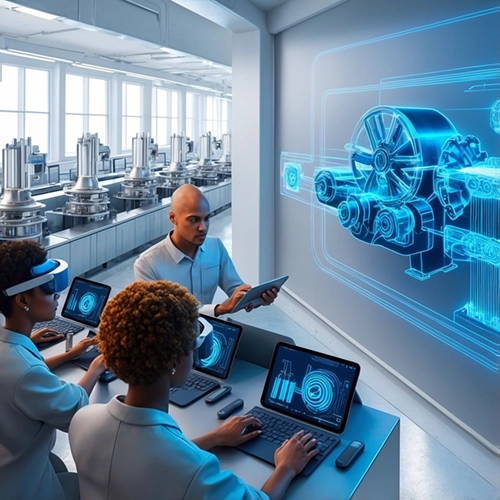Imagine a manufacturing plant where machines predict maintenance needs before breakdowns occur, production lines adjust in real time to optimize efficiency, and supply chains seamlessly coordinate globally. This isn’t a futuristic dream—it’s an emerging reality thanks to artificial intelligence (AI). A recent report by the National Association of Manufacturers (NAM) highlights the vast potential of AI for manufacturers, emphasizing the transformative impact it can have on the industry.
Revolutionizing Operations:
AI is set to revolutionize manufacturing operations in unprecedented ways. Powered by AI algorithms, predictive maintenance allows manufacturers to anticipate equipment failures and schedule maintenance during non-peak hours. This reduces downtime and extends the machinery’s lifespan, leading to significant cost savings.
AI-driven automation enhances production efficiency by optimizing workflows and minimizing human error. For instance, AI can dynamically adjust production parameters to ensure consistent product quality and maximize throughput. This could mean a machine adjusting its speed based on real-time data to avoid overproduction or underproduction. In the highly competitive manufacturing sector, these advancements provide a crucial edge, enabling companies to produce more with less.
Supply Chain Optimization:
The complexity of modern supply chains demands innovative solutions, and AI is stepping up to the challenge. AI can analyze vast amounts of data from various sources, such as suppliers, logistics providers, and market trends, to predict demand fluctuations and optimize inventory levels. This results in a more responsive and resilient supply chain that adapts to disruptions and effectively meets customer demand.
Additionally, AI-driven analytics can identify inefficiencies and bottlenecks within the supply chain. For example, it can analyze data to pinpoint areas where inventory is often overstocked or understocked, providing actionable insights for continuous improvement. By leveraging AI, manufacturers can achieve greater visibility and control over their supply chain, ultimately enhancing their competitiveness in the global market.
Enhancing Product Development:
AI is not just about improving existing processes; it’s also a powerful tool for innovation. In product development, AI can analyze customer feedback, market trends, and competitor products to identify opportunities for new products or enhancements to existing ones. This data-driven approach to innovation not only accelerates the development cycle but also increases the likelihood of market success, paving the way for an exciting future.
Furthermore, AI-powered design tools can assist engineers in creating optimized product designs, reducing material waste, and improving overall product performance. Integrating AI in the design process ensures manufacturers can bring high-quality, innovative products to market faster than ever.
Workforce Transformation:
Adopting AI in manufacturing doesn’t mean replacing human workers; instead, it empowers and transforms their roles. AI takes over repetitive and mundane tasks, allowing workers to focus on more complex and creative aspects of their jobs. This shift enhances job satisfaction and increases productivity and innovation within the workforce.
To fully realize the benefits of AI, manufacturers must invest in upskilling their employees. Training programs that equip workers with the skills to work alongside AI systems are essential. By fostering a culture of continuous learning and adaptation, manufacturers can ensure a smooth transition to an AI-powered future.
Challenges and Considerations:
While the potential of AI in manufacturing is immense, it’s essential to acknowledge the challenges that come with its implementation. Data security and privacy concerns, integration with existing systems, and the need for substantial upfront investment are some hurdles manufacturers must overcome. However, these challenges are not insurmountable.
Strategic partnerships with technology providers, robust cybersecurity measures, and a phased approach to AI adoption can mitigate these risks. Additionally, manufacturers should prioritize transparency and ethical considerations in their AI initiatives. By doing so, they can build trust with customers and stakeholders, reassuring them of the responsible use of AI in the manufacturing sector.
Conclusion:
The new AI digital world offers incredible opportunities for manufacturers willing to embrace change and innovation. AI is poised to reshape the manufacturing landscape, from revolutionizing operations and optimizing supply chains to enhancing product development and transforming the workforce. By leveraging AI’s vast potential, manufacturers can achieve unprecedented efficiency, agility, and competitiveness, securing their place in the industry’s future.
For more insights and detailed analysis, you can read the full NAM report on the potential of AI for manufacturers [here](https://www.assemblymag.com/articles/98658-nam-report-touts-vast-potential-of-ai-for-manufacturers).







